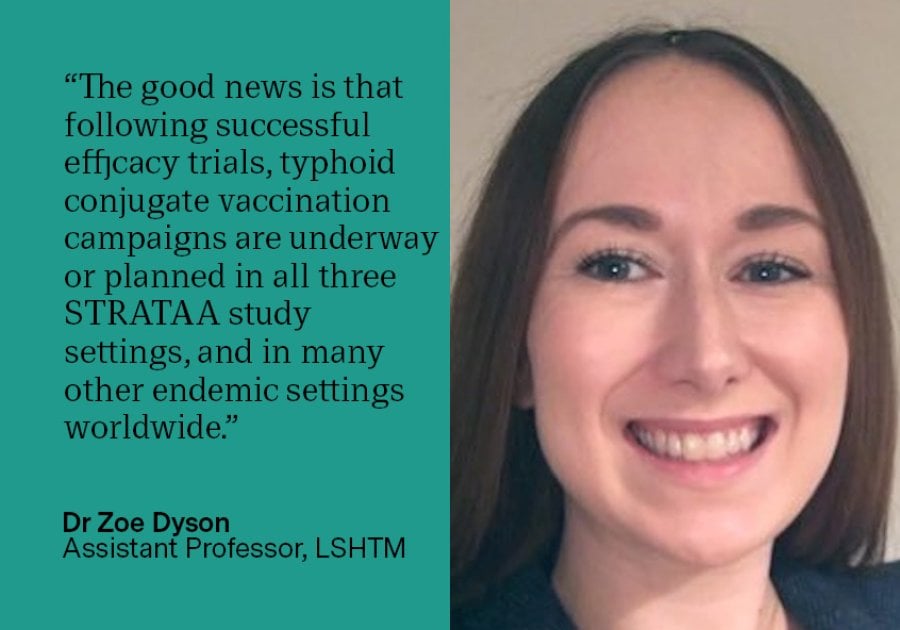
The bacteria are transmitted via faecally contaminated food or water, causing more than 14 million infections worldwide each year, and more than 130,000 deaths. Most of the disease burden is concentrated in South Asia, followed by sub-Sahaharan Africa, and children are disproportionately affected. Typhoid conjugate vaccines (TCVs) are safe and effective in young children, but are not yet routinely used in most high-burden countries.
The Strategic Typhoid Alliance Across Africa and Asia (STRATAA) consortium undertook surveillance for typhoid fever cases across urban settings in Bangladesh, Nepal, and Malawi between 2016 and 2019. Typhoid pathogens were cultured from the blood of febrile patients, and the genomes of 731 Typhi and Paratyphi A bacteria were sequenced. The study, funded by Wellcome Trust, Bill & Melinda Gates Foundation, European Union’s Horizon 2020, and the National Institute for Health and Care Research (NIHR), characterized the genomic epidemiology, drug resistance mechanisms, and transmission dynamics of these pathogens.
Comprehensive genomic epidemiology analyses revealed that >97% of cases were resistant to antimicrobials, with high levels of resistance to older drugs chloramphenicol, co-trimoxazole and ampicillin observed in Blantyre, Malawi (98%) and Dhaka, Bangladesh (32%), with lower rates in Kathmandu, Nepal (1.4%). Resistance to ciprofloxacin, the drug currently recommended by the World Health Organization for treating typhoid, was notably high in Dhaka (99.8%) and Kathmandu (89%). Typhi genotype 4.3.1 (H58), commonly associated with intercontinental transmission and AMR typhoid, caused the majority of infections across all three settings, with different variants of this genotype observed in each location.
Phylogenetic analyses indicated that almost all AMR infections (>98%) were the result of the ongoing transmission of pre-existing, locally-established, pathogen variants that had been endemic to each setting for many years. Moreover, two thirds of infections were part of case clusters that each persisted for one-to-two years across multiple age groups, suggesting sustained transmission, which may occur person-to-person or through shared exposure to contaminated food or water. These findings, in particular the persistent circulation of AMR typhoid in all settings, support the need for greater investment in typhoid prevention through vaccination and water, sanitation, and hygiene (WASH) improvements.
Dr Zoe Dyson, Assistant Professor at LSHTM said “It’s been a privilege to work with the STRATAA study group. Together with our colleagues in Blantyre, Kathmandu, and Dhaka, we have highlighted the urgent need to shift focus to disease prevention through vaccines and WASH to combat drug resistant typhoid.
"The good news is that following successful efficacy trials, typhoid conjugate vaccination campaigns are underway or planned in all three STRATAA study settings, and in many other endemic settings worldwide.”
Publication
Zoe A Dyson, et al. Pathogen diversity and antimicrobial resistance transmission of Salmonella enterica serovars Typhi and Paratyphi A in Bangladesh, Nepal, and Malawi: a genomic epidemiological study. The Lancet Microbe. https://doi.org/10.1016/S2666-5247(24)00047-8
LSHTM's short courses provide opportunities to study specialised topics across a broad range of public and global health fields. From AMR to vaccines, travel medicine to clinical trials, and modelling to malaria, refresh your skills and join one of our short courses today.
